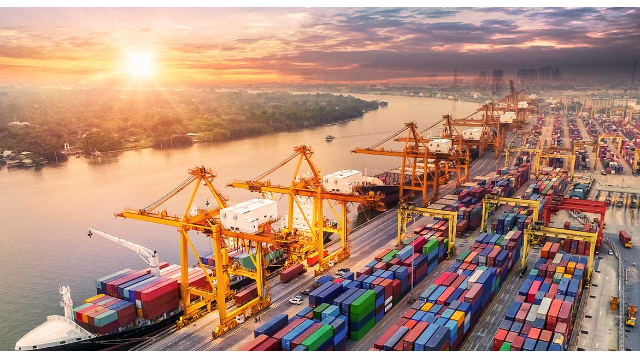Supply chains are almost anorectic. Can the sector survive the next crisis?
The coronavirus crisis hits the supply chain & logistics particularly hard, and there is no argument here. It’s equally evident that returning to business as usual is not an option, as the next global crisis is already upon us. We live in disruptive times, and resilience will be essential to survive and thrive. But is the supply chain & logistics sector resilient enough? We asked Tom Van Woensel and Wayne Visser, professors at Antwerp Management School and experts in supply chain management and sustainability, respectively.
Supply chains have become almost anorexic
When it comes to resilience, the supply chain industry is not exactly setting a good example, on the contrary. As Dr. Visser sees it, many supply chains are just not designed to be resilient: “Over the years, we have been optimizing supply chains literally for up-to-the-minute perfection, so now we’ve come to the point where there is no more slack in the system. At the same time, spare capacity is precisely one of the underlying principles of resilient systems. You need to have built-in redundancy, so if things go wrong, you can fall back on extra supplies, and extra people.”
Prof. Dr. Van Woensel puts it even more boldly: “Supply chains have become almost anorexic. Naturally, you want to avoid obesity, but now we see the other extreme: all the extras have been cut. So basically, though our supply chains may be super-efficient from a cost perspective, they are no longer protected from global disruptions, such as the pandemic. And disruptions are piling up like crazy nowadays, so the supply chain industry will have to make some changes, one way or another.”
Sustainability is not just about reducing your carbon footprint
“There are several ways of building sustainable businesses in disruptive times”, Dr. Visser continues. “Sustainability is not just about reducing your carbon footprint. The challenges we are facing are typically global systems challenges, impacting not only the environment but also the economy, society as a whole, and the political level. So we need to take on a holistic approach. One key aspect is the people: are your employees resilient in a crisis? Before the outbreak of Covid-19, people in the delivery industry, for instance, were often already pushed to their limit, what with next-day or even same-day delivery trends. When the crisis hit, employees started dropping out. If you want your employees to show resilience throughout a crisis, you need to be purpose-driven instead of efficiency-driven. When people feel that their company truly has their well-being, and society’s well-being, at heart, they are much more willing to go the extra mile.”
Prepare for the future. With our Master Class Global Supply Chain & Logistics
“Unfortunately”, Prof. Dr. Van Woensel adds, “in practice, sustainability efforts are still too much driven by cost and risk management. Covid-19 acted as an eye-opener and accelerator for sustainability, sure, but what you see is companies rethinking their supply chains to mitigate risks. They’re thinking about reshoring, for instance, to be more independent of global evolutions. And, incidentally, it may also be good for the environment, which is then highlighted in their marketing campaigns. But that’s greenwashing instead of a true willingness to invest in sustainability in the long term.”
Risk management as a driver for change cán lead to sustainable outcomes
Dr. Visser is less pessimistic: “If you look at the economy in the past decades, we are coming around, from shareholder-driven, short-term capitalism toward stakeholder capitalism, where profits are no longer the main driver. When I started my research and work on sustainability 30 years ago, few people cared about it. At the Rio Earth Summit in 1992, sustainability was put on the global agenda, but from a business perspective, sustainability issues were extremely low-risk. There were no material consequences, for example, many moved production to countries with low labor costs, even if that involved unsafe or unhealthful workplace conditions. Dirty production processes were not penalized, either. But today, there are consequences. Fossil fuels-based industries are taxed, we have the Modern Slavery Act in the UK, the Dodd-Frank Act in the USA and so on. Governments are increasingly creating incentives and disincentives, and the consumer is becoming much more critical, disapproving of unsustainable practices. So, risks have gone up. In this way, risk management is the driver of change, and can lead to sustainable outcomes.”
The industry has a golden opportunity here to build better supply chains
“Change will need to be underpinned by joint efforts”, Prof. Dr. Van Woensel adds. “We are dealing with highly complex systems here. Supply chains are so globalized and interconnected these days that if you pull a string somewhere, everything else along the chain starts moving, often leading to undesirable effects. But Dr. Visser is right. Things are finally falling into place: government policies, consumer awareness, and with the pandemic, companies, too, have been forced to rethink their strategy and operations. What’s more, we have not touched upon that yet: we now also have the technology to create scalable solutions. So, the industry has a golden opportunity here to build better supply chains.”
“The opportunity is here,” says Visser, “and companies need to seize it now, or they will be out of business soon. People still think that sustainability costs more, and is less efficient and profitable. But, in the long term, the opposite is true. Just think of circular supply chains, for instance. They reduce negative environmental impact and are far less likely to be disrupted by the next global crisis because you are much more in control of the resource flow. So many solutions are a win for your business, your customers, and society.”

comments0
You don't have the rights to read or add a comment.
Suggested Articles


